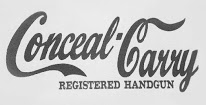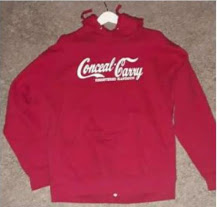The Board sustained an opposition to registration of the proposed mark CONCEAL-CARRY REGISTERED HANDGUN in the stylized form shown below, for "Hats; Hoodies; Jackets; Jerseys; Sweaters; T-shirts; Graphic T-shirts; Short-sleeved or long-sleeved t-shirts; Sports jerseys," on the ground of likelihood of dilution by blurring of opposer's mark COCA-COLA in Spencerian script, for beverage products and a wide variety of other goods, including clothing. The Board found that opposer's mark is "extremely famous," that Applicant Robert Troy Hoff intended to trade off of opposer's goodwill, and that the distinctiveness of the Coca-Cola mark will be impaired by use and registration of his mark. The Coca-Cola Company v. Robert Troy Hoff, Opposition No. 91244286 (May 14, 2021) [not precedential] (Opinion by Judge Christopher Larkin).


The Federal Circuit "'has set forth the following four elements a plaintiff must prove in a Board proceeding in order to prevail on a claim of dilution by blurring:
- the plaintiff owns a famous mark that is distinctive;
- the defendant is using a mark in commerce that allegedly dilutes the plaintiff's famous mark;
- the defendant's use of its mark began after the plaintiff's mark became famous; and
- the defendant's use of its mark is likely to cause dilution by blurring or by tarnishment.'" quoting N.Y. Yankees, 114 USPQ2d at 1501-02.
As to the fame of opposer's mark, the Board reviewed decades of evidence regarding sales and advertising, and concluded that "[a]l of the non-exclusive factors set forth in Section 43(c)(2)(A) of the Trademark Act support a finding that the Coca-Cola Script Mark is a distinctive mark that became extremely famous long ago and remains so today."
The Board then looked to the six non-exclusive factors of Section 43(c)(B)(i)-(vi)) to determine whether Hoff's mark is likely to dilute the distinctiveness of opposer's Script Mark. Paraphrasing the Yankees case, the Board ruled that "consumers encountering Applicant's mark will immediately be reminded of Opposer's famous [Coca-Cola Script Mark] and associate the two." As to the issue of intent, the Board found "no credible explanation for this choice by Applicant other than a desire to have his mark stand out because of its striking similarity to the famous Coca-Cola Script Mark."
Moreover, Applicant Hoff's decision to hyphenate the two words and to use the term "conceal-carry" rather than the common term "concealed carry" is "explicable only by his desire to make the phrase mimic its counterpart "Coca-Cola" in the Coca-Cola Script Mark." Hoff's mark also contains the block letter term "REGISTERED HANDGUN," which imitates Coca-Cola's historical uses of the terms "Trade-Mark Registered" and "Reg. U.S. Pat. Off." below the Coca-Cola Script Mark. Hoff displays his mark in white on a red background, just as Coca-Cola has displayed its mark in red and white for decades.
The Board therefore found that "[a]pplicant is attempting to trade on the goodwill and fame generated by the [Coca-Cola Script Mark] mark in order to promote and market his own [goods]. As such, this dilution factor also favors [O]pposer.'" quoting Chanel, 110 USPQ2d at 2026.
There was no evidence of actual association between the involved marks, but Hoff's application was filed on an intent-to-use basis, and he admitted in discovery that "[a]s of August 7, 2019, he had no sales of product bearing the Mark." "'Thus, there has been a limited opportunity for the public to make any actual association between the parties' design marks. We find this factor to be neutral.'" quoting N.Y. Yankees, 114 USPQ2d at 1509.
Withe regard to the impairment of the Coca-Cola script mark, opposer's witness "expressed Opposer's concern that if it 'was incorrectly associated with a position that TCCC had not adopted or with which TCCC did not agree, TCCC would lose control of at least a portion of its goodwill and reputation that the Coca-Cola Script Mark symbolizes, especially with consumers who do not agree with the position.'"
Opposer's concerns are legitimate. There is a fervent debate in the United States between proponents of gun rights, such as Applicant, and proponents of limitations on those rights. In that debate, Opposer, like Applicant, has the right to take one side or the other, or not to participate at all. We have found above, however, that Applicant's mark will immediately conjure up Opposer's famous Coca-Cola Script Mark, resulting in the association of Opposer with a particular position in the minds of purchasers and observers of Applicant's clothing. Even if that association is ephemeral for some persons, it compromises Opposer's ability to exercise exclusive control over the goodwill symbolized by the Coca-Cola Script Mark. For members of the public who have been exposed to Applicant's mark, Opposer may appear to be a hypocrite if it later elects to take the opposite position in the gun rights debate or simply remains neutral.
The Board concluded that Hoff's use and registration of his proposed mark is likely to dilute by blurring the distinctiveness of the Coca-Cola script mark, and so the Board sustained the opposition under Section 43 of the Trademark Act.
Read comments and post your comment here.
TTABlog comment: Not very often does the Board decide a dilution claim. Usually if it find likelihood of confusions it will decline to reach the dilution claim. Here it did the opposite. BTW, why wasn't this deemed precedential? Maybe the decision breaks no new ground, but the opinion is an impressive review of dilution law.
The content of this article is intended to provide a general guide to the subject matter. Specialist advice should be sought about your specific circumstances.

